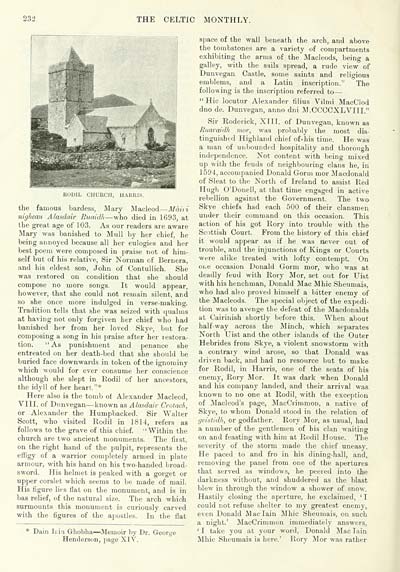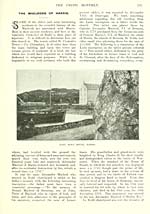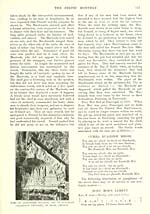Blair Collection > Celtic monthly > Volume 6, 1898
(332)
Download files
Complete book:
Individual page:
Thumbnail gallery: Grid view | List view

232
THE CELTIC MONTHLY.
K"D1L CHURCH, HARRIS.
the famous bardess, Mary Macleod — Maiii
nighean Alasdair Ruaidh — who died in 1693, at
the great age of 103. As our readers are aware
Mary was banished to Mull by her chief, he
being annoyed because all her eulogies and her
best poem were composed in praise not of him-
self but of his relative, Sir Norman of Bernera,
and his eldest son, John of Contullich. She
was restored on condition that she should
compose no more songs. It would appear,
however, that she could not remain silent, and
.so she once more indulged in verse-making.
Tradition tells that she was seized with qualms
at having not only forgiven her chief who had
banished her from her loved Skye, but for
composing a song in his praise after her restora-
tion. "As punishment and penance she
entreated on her death-bed that she should be
buried face downwards in token of the ignominy
which would for ever consume her conscience
although she slept in Rodil of her ancestors,
the idyll of her heart."*
Here also is the tomb of Alexander Macleod,
VIII. of Diinvegan — known as Alasdair Crotacli,
or Alexander the Humpbacked. Sir Walter
Scott, who visited Rodil in 1814, refers as
follows to the grave of this chief. ''Within the
church are two ancient monuments. The (list,
on the right hand of the pulpit, represents the
etiigy of a warrior completely armed in plate
armour, with his hand on his two-handed broad-
sword. His helmet is peaked with a gorget or
upper corslet which seems to be made of mail.
His figure lies flat on the monument, and is in
bas relief, of the natural size. Tlie arch which
surmounts this monument is curiously carved
with the figures of the apostles. In the flat
* Dain ]i.iii Ghobha — Memoir by Dr. George
Henderson, page XIA'.
space of the wall beneath the arch, and above
the tombstones are a variety of compartments
exhibiting the arms of the Macleods, being a
galley, with the sails spread, a rude view of
Dunvegan Castle, some saints and religious
emblems, and a Latin inscription." The
following is the inscription referred to —
"Hie locutur Alexander filius Vilnii MacClod
dno de. Dunvegan, anno dni M.CCCCXLVIII."
Sir Roderick, XIII. of Dunvegan, known as
Riiaraidh mor, was jirobalily the most dis-
tinguished Highland chief of.his time. He was
a man of unbounded hospitality and thorough
independence. Not content with being mixed
up with the feuds of neighbouring clans he, in
1594, accompanied Donald Gorui mor Macdonald
of Sleat to the North of Ireland to assist Red
Hugh O'Donell, at that time engaged in active
rebellion against the Government. The two
Skye chiefs had each 500 of their clansmen
under their command on tliis occasion. This
action of his got Rory into trouble with the
Scottish Court. From the history of this chief
it would appear as if he was ttever out of
trouble, and the injunctions of Kings or Courts
were alike treated with lofty contempt. On
oi.e occasion Donald Gorm mor, who was at
deadly feud with Ror}' Mor, set out for Uist
with his henchman, Donald Mac Mhic Sheumais,
who had also proved himself a bitter enemy of
the Macleods. The special object of the expedi-
tion was to avenge the defeat of the Macdonalds
at Cairinish shortly before this. When about
half-way across the Minch, which separates
North TJist and the other islands of the Outer
Hebrides from Skye, a violent snowstorm with
a contraiy wind arose, so that Donald was
driven back, and had no resource but to make
for Rodil, in Harris, one of the seats of his
enemy, Rory Mor. It was dark when Donald
and his company landed, and their arrival was
known to no one at Rodil, with the exception
of Macleod's page, MacCrimmon, a native of
Skye, to whom Donald stood in the relation of
gcistidli, or godfather. Rory Mor, as usual, had
a number of the gentlemen of his clan waiting
on and feasting with him at Rodil House. The
severity of the storm made the chief uneasy.
He paced to and fro in his dining-hall, and,
removing the panel from one of the apertures
that served as window.s, he peered into the
darkness without, and shuddered as the blast
blew in through the window a shower of snow.
Hastily closing the aperture, he exclaimed, 'I
could not refuse shelter to my greatest enemy,
even Donald Mac Iain Mhic Sheumais, on such
a night.' MacCrimmon immediately answers,
'I take you at your word, Donald Mac Iain
Mhic Sheumais is here.' Rory Mor was rather
THE CELTIC MONTHLY.
K"D1L CHURCH, HARRIS.
the famous bardess, Mary Macleod — Maiii
nighean Alasdair Ruaidh — who died in 1693, at
the great age of 103. As our readers are aware
Mary was banished to Mull by her chief, he
being annoyed because all her eulogies and her
best poem were composed in praise not of him-
self but of his relative, Sir Norman of Bernera,
and his eldest son, John of Contullich. She
was restored on condition that she should
compose no more songs. It would appear,
however, that she could not remain silent, and
.so she once more indulged in verse-making.
Tradition tells that she was seized with qualms
at having not only forgiven her chief who had
banished her from her loved Skye, but for
composing a song in his praise after her restora-
tion. "As punishment and penance she
entreated on her death-bed that she should be
buried face downwards in token of the ignominy
which would for ever consume her conscience
although she slept in Rodil of her ancestors,
the idyll of her heart."*
Here also is the tomb of Alexander Macleod,
VIII. of Diinvegan — known as Alasdair Crotacli,
or Alexander the Humpbacked. Sir Walter
Scott, who visited Rodil in 1814, refers as
follows to the grave of this chief. ''Within the
church are two ancient monuments. The (list,
on the right hand of the pulpit, represents the
etiigy of a warrior completely armed in plate
armour, with his hand on his two-handed broad-
sword. His helmet is peaked with a gorget or
upper corslet which seems to be made of mail.
His figure lies flat on the monument, and is in
bas relief, of the natural size. Tlie arch which
surmounts this monument is curiously carved
with the figures of the apostles. In the flat
* Dain ]i.iii Ghobha — Memoir by Dr. George
Henderson, page XIA'.
space of the wall beneath the arch, and above
the tombstones are a variety of compartments
exhibiting the arms of the Macleods, being a
galley, with the sails spread, a rude view of
Dunvegan Castle, some saints and religious
emblems, and a Latin inscription." The
following is the inscription referred to —
"Hie locutur Alexander filius Vilnii MacClod
dno de. Dunvegan, anno dni M.CCCCXLVIII."
Sir Roderick, XIII. of Dunvegan, known as
Riiaraidh mor, was jirobalily the most dis-
tinguished Highland chief of.his time. He was
a man of unbounded hospitality and thorough
independence. Not content with being mixed
up with the feuds of neighbouring clans he, in
1594, accompanied Donald Gorui mor Macdonald
of Sleat to the North of Ireland to assist Red
Hugh O'Donell, at that time engaged in active
rebellion against the Government. The two
Skye chiefs had each 500 of their clansmen
under their command on tliis occasion. This
action of his got Rory into trouble with the
Scottish Court. From the history of this chief
it would appear as if he was ttever out of
trouble, and the injunctions of Kings or Courts
were alike treated with lofty contempt. On
oi.e occasion Donald Gorm mor, who was at
deadly feud with Ror}' Mor, set out for Uist
with his henchman, Donald Mac Mhic Sheumais,
who had also proved himself a bitter enemy of
the Macleods. The special object of the expedi-
tion was to avenge the defeat of the Macdonalds
at Cairinish shortly before this. When about
half-way across the Minch, which separates
North TJist and the other islands of the Outer
Hebrides from Skye, a violent snowstorm with
a contraiy wind arose, so that Donald was
driven back, and had no resource but to make
for Rodil, in Harris, one of the seats of his
enemy, Rory Mor. It was dark when Donald
and his company landed, and their arrival was
known to no one at Rodil, with the exception
of Macleod's page, MacCrimmon, a native of
Skye, to whom Donald stood in the relation of
gcistidli, or godfather. Rory Mor, as usual, had
a number of the gentlemen of his clan waiting
on and feasting with him at Rodil House. The
severity of the storm made the chief uneasy.
He paced to and fro in his dining-hall, and,
removing the panel from one of the apertures
that served as window.s, he peered into the
darkness without, and shuddered as the blast
blew in through the window a shower of snow.
Hastily closing the aperture, he exclaimed, 'I
could not refuse shelter to my greatest enemy,
even Donald Mac Iain Mhic Sheumais, on such
a night.' MacCrimmon immediately answers,
'I take you at your word, Donald Mac Iain
Mhic Sheumais is here.' Rory Mor was rather
Set display mode to: Large image | Transcription
Images and transcriptions on this page, including medium image downloads, may be used under the Creative Commons Attribution 4.0 International Licence unless otherwise stated. ![]()
| Early Gaelic Book Collections > Blair Collection > Celtic monthly > Volume 6, 1898 > (332) |
|---|
| Permanent URL | https://digital.nls.uk/75858435 |
|---|
| Shelfmark | Blair.58 |
|---|---|
| Additional NLS resources: | |
| Attribution and copyright: |
|
| Description | A selection of books from a collection of more than 500 titles, mostly on religious and literary topics. Also includes some material dealing with other Celtic languages and societies. Collection created towards the end of the 19th century by Lady Evelyn Stewart Murray. |
|---|
| Description | Selected items from five 'Special and Named Printed Collections'. Includes books in Gaelic and other Celtic languages, works about the Gaels, their languages, literature, culture and history. |
|---|

